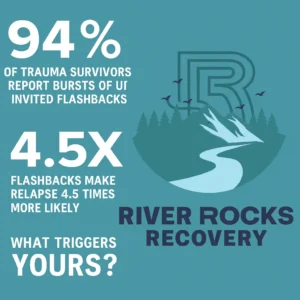You didn’t plan to relapse. No one does.
But there you were—three months sober, trying to make dinner or fold laundry—and suddenly, it hit. That wave. That flash. That memory. You didn’t invite it in. You didn’t want it. But in a split second, it was like your body took over.
If this happened to you recently, we want you to hear this loud and clear:
You’re not broken. You’re not back at square one.
And you’re definitely not alone.
At River Rocks Recovery, we meet a lot of people in Middletown and surrounding areas who feel blindsided by relapse after a period of progress. Often, what we discover underneath the surface isn’t weakness—it’s trauma. And one of the most powerful tools we use to help untangle that trauma is EMDR therapy.
That Flashback Wasn’t Random
Sometimes the urge to use doesn’t come from stress or a fight or even a bad day. Sometimes it comes from a memory. A scene your mind replays without warning. A body memory you can’t put into words. A frozen moment that still lives inside you—unprocessed, unfinished.
And when that kind of memory gets triggered, your nervous system reacts like it’s back there, in that moment. For many people in recovery, that’s when cravings come roaring back.
This isn’t a lack of willpower. It’s biology. It’s the body saying, “We’re in danger again.”
And EMDR therapy is one way to help the body understand: You’re safe now.
You Didn’t Ruin Everything
We need to say this again: relapse does not mean you’ve failed.
A slip doesn’t erase the work you’ve done. It doesn’t make you a fraud. It means something new needs your attention.
In fact, one of the bravest things you can do in recovery is to ask:
“What was that really about?”
That question—that moment of curiosity—is where healing begins. It’s not punishment. It’s an invitation.
At River Rocks Recovery, we see relapse as part of many people’s recovery—not the end of it. We don’t meet it with shame. We meet it with support, tools, and a space to figure out what’s really going on beneath the surface.
What Is EMDR Therapy?
EMDR (Eye Movement Desensitization and Reprocessing) is a trauma-focused therapy that helps people process painful memories that are “stuck” in the nervous system. Unlike traditional talk therapy, EMDR uses bilateral stimulation—usually eye movements or tapping—to help the brain rewire its emotional response to trauma.
In a typical EMDR session, you’ll:
- Identify a distressing memory or trigger
- Connect that memory to the thoughts and emotions it brings up
- Engage in guided eye movements while holding the memory in mind
- Begin to reprocess it—lessening its emotional charge
The result?
You may still remember what happened—but it no longer feels like it’s happening to you in the present.
And for people in addiction recovery, that can be the difference between a trigger and a choice.
Why Trauma Feeds the Urge to Use
Many people begin using substances long before they have words for their pain. Childhood neglect. Loss. Abuse. Being told to stay silent. Being made to feel invisible.
And even if your trauma isn’t “that bad” on paper, your body may tell a different story.
Substance use often starts as a survival strategy. A way to numb the flashbacks, silence the guilt, or outrun the emptiness. So when those buried memories resurface—especially during early recovery—it can feel impossible to resist the urge to cope the only way you used to know.
That’s why EMDR therapy is such a game-changer. It helps the body finish the trauma cycle—so the cravings don’t have to carry it anymore.

The Middletown EMDR Option That Doesn’t Start You Over
If you’re in Middletown or nearby, we want you to know that you don’t have to drive to Cincinnati or Columbus to get access to trauma therapy. We offer EMDR therapy right here—as part of our full continuum of care for addiction and mental health.
At River Rocks Recovery, we integrate EMDR into both individual therapy and as-needed alumni support. Whether you’re re-engaging after relapse or looking for a deeper layer of healing, our licensed clinicians meet you where you are.
This isn’t about being “ready” or “starting over.”
It’s about being real—with yourself, with your past, and with the patterns that still hold you.
What If I’m Not Sure I Deserve Another Chance?
Then we want to remind you: relapse isn’t a moral failure. It’s a signal.
You didn’t lose your worth. You don’t have to earn your way back into recovery. You’re still welcome here. Always.
“It wasn’t until I got into EMDR that I realized how many memories I’d just stuffed down and hoped would go away. Once I started processing them, the cravings started to make more sense. I wasn’t weak—I was hurting.”
– Alumni Client, 2023
EMDR and Relapse: What to Expect
If you’re new to EMDR, here’s what you might expect in your first few sessions:
- Preparation: Your therapist will explain the process, answer questions, and help you develop grounding tools.
- Targeting: Together, you’ll identify memories or triggers to work on. These could be big T traumas—or smaller, recurring emotional wounds.
- Processing: Using bilateral stimulation, your therapist will guide you through revisiting these memories in small, manageable ways.
- Reprocessing: Over time, you’ll build new, less distressing associations—and feel more emotionally regulated.
It’s not magic. It takes work. But it works.
FAQ: EMDR Therapy for Relapse Recovery
Is EMDR safe if I just relapsed?
Yes. EMDR is structured and therapist-led, with built-in support to avoid emotional overwhelm. In fact, many people find it most helpful after a relapse—when emotional triggers are fresh and easier to identify.
Do I need to be completely sober to start EMDR?
We recommend some degree of stabilization—but full abstinence isn’t a hard requirement. Our clinicians work with you to find the right timing and pace for your needs.
How long does EMDR therapy take to work?
Some people experience relief within a few sessions. Others take longer. The pace depends on the complexity of your trauma and how your nervous system responds. There’s no rush—we go at your speed.
What kinds of trauma can EMDR help with?
EMDR is effective for a wide range of traumas, including childhood neglect, abuse, grief, loss, and even seemingly “small” experiences that left a big emotional imprint.
Is EMDR covered by insurance?
Many insurance plans do cover EMDR therapy. Our team at River Rocks Recovery can verify your benefits and help you understand what’s included.
You’re Still In This
If you’ve made it this far into the blog, here’s what we know about you:
You still care. You’re still trying. You haven’t given up.
And that means there’s still something in you that wants to heal—not just stop using, but heal.
EMDR therapy isn’t a magic fix. But it’s a way forward. A way through. A way to stop being ambushed by your own memories and start reclaiming your peace.
Ready to feel safe in your own mind again?
Call (888) 905-6281 or visit our EMDR Therapy page to learn more about how we support relapse recovery in Middletown, Ohio.




























